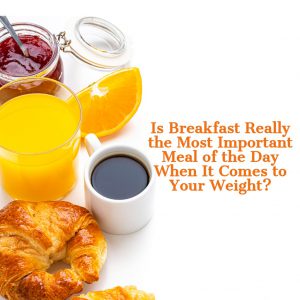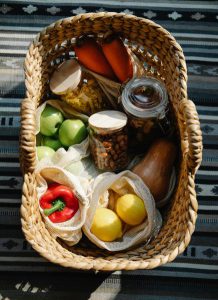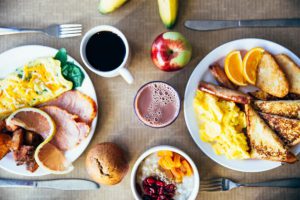How many times have we heard it? Breakfast is the most important meal of the day. By now, probably about as many times as we’ve heard people dispute that old saying! Nutrition-wise, it’s probably not so true. But when it comes to our weight? Well, things are a little more complicated. There’s been a lot of popular advice floating around regarding the timing of meals and weight loss, and there are also studies that have pointed to eating earlier as the key to losing weight. But now, there’s evidence suggesting that we might be able to rethink this. So, what should we think if we’re trying to lose weight? To breakfast big or not to breakfast big? That is the question!
Chrono-Nutrition
So why should we even think about or care what time of day we’re eating? Other than getting some pretty wicked heartburn if you’re scarfing down nachos at 1 am, scientists in recent years have begun to link various aspects of our health to the times of day we eat. This emerging field, known as “chrono-nutrition,” builds on the relationship between our eating patterns in regards to time, circadian rhythms, and metabolic health. Think of it this way: disruption to our circadian rhythms can be pretty hard on our bodies. And our metabolism aligns with a circadian rhythm, too. So eating out of alignment with that can be problematic for our bodies.
So in this field, a growing body of evidence indicates that aligning our food intake to the times of day when circadian rhythms in metabolic processes are “optimized for nutrition,” according to one study, “may be effective for improving metabolic health.” Does that mean it can also aid in weight loss? Maybe. Two studies from 2013 suggested that eating a big breakfast, smaller lunch, and even smaller dinner could help you lose weight. What they found even suggested that it is true that eating more at breakfast keeps you satisfied.
But there’s always a “but,” right? Yup. Just this past fall, a major new study on this subject was published. And it is forcing us to question again whether breakfast really is the most important meal of the day.
The New Study
To investigate the link between the size of breakfast and dinner and their effect on hunger, a team of researchers at the universities of Aberdeen and Surrey conducted a controlled study on healthy but overweight people.
The participants were fed two diets, each for four weeks. A big breakfast and a small dinner, and a small breakfast with a big dinner (lunches were kept the same). The meals were given to the participants so the researchers knew exactly what they were eating. They measured the participants’ metabolism, including monitoring how many calories they burned. All of the participants had periods of eating both diets, so that the researchers could not only compare the different people in the different groups, but also how the individuals reacted to each diet.
They predicted that they would have similar findings to the 2013 studies. That a big breakfast and small dinner would increase calories burned and weight lost. But that just wasn’t the case. The results of the experiment found no differences in body weight or any biological measures of energy usage between the two meal patterns.
There were also no differences in daily levels of blood glucose, insulin, or lipids. This is important because changes of these factors in the blood are associated with metabolic health.
So a rare thing happened: the scientists were surprised! Contrary to what they thought would happen, their research suggests that the way our bodies process calories in the morning versus the evening does not influence weight loss the way other studies suggest.
But – yes, there’s another but! – they did find one thing that might make you stick to your breakfast regime. If you’re a breakfast eater and have your weight on your mind. When the participants were eating the meal pattern of a big breakfast and small dinner, they reported less hunger throughout the day. So if you’re looking to lose weight, there’s still a chance that eating that way might help you to better control your hunger and eat less.
Breakfasting the Right Way
So we’re sorry to say that we can’t definitively say if eating breakfast is the way to go for weight loss. But nutritionists still recommend starting your day with breakfast. Since they say it can set you up for better choices during the rest of your day. And it can also help you to meet the daily recommendations for certain food groups and nutrients. The jury is out on their other assertion that it means burning more calories throughout the day. But one thing we can say for sure: eating breakfast is only healthy if you’re doing it right!
If you’re a breakfast eater, and want to make it your most important meal of the day, look for foods that are energizing, satiating, and packed with a wide variety of important nutrients. Consider these tips for upping your breakfast game:
- Include an antioxidant source (like blueberries and kale – hello, smoothie!) to combat stress to your body.
- Choose whole grains over refined ones to help keep you feeling fuller longer, and to keep that bad cholesterol in check.
- Opt for whole foods whenever possible to get more fiber, and keep you feeling fuller for longer.
- Limit sugar to avoid blood sugar spikes and crashes, which can lead to anxiety, fatigue, irritability, headaches, and difficulty concentrating, not to mention craving more high-carb foods, leading to a vicious cycle of overeating. And get this: studies have found that people who eat sugary breakfasts have about 10% higher total daily sugar intake compared to people who chose non-sugary breakfasts.
- Eat some protein before your carbs/fruit: this may reduce blood glucose spikes compared with eating carbs first. Studies also show that having a meal combining both protein and carbs “can slow the digestive process. Making your breakfast more satisfying and reducing your post-breakfast cravings,” according to Corinne Kohlen, registered dietitian.
- Don’t forget the fruits and veggies!
- Prep your breakfast ahead of time to avoid unhealthy choices.
- Get nutty with some nuts or nut butter. Did you know that eating a few more nuts a day can lead to a lower risk of weight gain and obesity?
- Choose solids over liquids, since they keep you fuller longer. But if a smoothie is the way you’ll get all those good, nutritious things into your body, we won’t tell!
- Consider eating your breakfast in two mini meals, to trick yourself into thinking you’re getting more.
- Don’t fear the fat, or the good fats at least, especially since you’re more likely to burn them off during the day if you eat them at breakfast.
Your mom might still be insisting that you eat your breakfast. Because – say it all together now – it’s the most important meal of the day. But not everyone is 100% convinced, at least when it comes to weight loss. With that being said, though, there is still evidence that eating your big meal early in the day can be good for weight loss. And your health overall. Especially since it can lead to healthier choices and fitting in more nutrition throughout the day (as long as you do it right!). And it’s certainly better than nachos at 1 am…most of the time.
Co-written by Joanna Bowling


